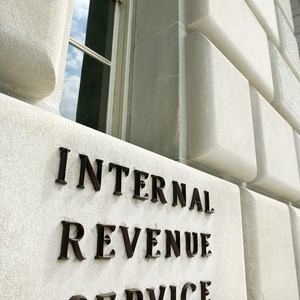
Employers must take federal income tax out of your paychecks, unless you’re tax exempt from that necessity. Exemption only occurs in two situations: For the previous year, you had a refund of all federal income tax withheld because you had no tax liability, or for the current year, you expect to have no tax liability and would receive a refund of any federal income tax withheld. The payroll department is supposed to make the withholding based on the conditions on your W-4 form. Claim too many allowances, and the correct amount of tax won't come out of your paychecks. For that, you can expect IRS penalties.
Calculating Your Withholding
The less money you earn, the less federal income tax you pay. It's possible that no federal taxes is taken out of your paycheck because you didn't earn enough money in the pay period. In this case, you should be okay when you file your taxes as long as you filled out your W-4 form correctly. Your employer uses the tax tables in Internal Revenue Service Publication 15 to figure your withholding.
Penalties and Interest
If you were supposed to have a withholding and your employer didn't take out federal taxes, the IRS will know when your employer files your annual W-2 form. If you don't file a tax return you may face penalties and interest. You face the same problem f you file a return and don't pay the taxes due. The failure-to-file penalty is normally 5 percent of the monthly delinquent tax. The failure-to-pay penalty is typically 0.5 percent. Interest is generally added daily and the rate is fixed every three months.
Lien and Levy
If you don't pay your tax bill with your return the IRS will send you a bill. If you still don’t pay or make arrangements to pay, the agency may file a lien or levy against you. A lien is a claim against your property. A levy is an actual seizure of your property to fulfill the debt and may show up on your credit report. Items such as your home, vehicle, boat, bank account, wages, dividends and retirement income are all fair game. If you have a tax debt, contact the agency by phone or online to set up an installment plan. You can also make an offer in compromise, which lets you settle at a reduced amount.
Refund Offset
If you're due a refund because of credits and deductions that you claimed, the IRS will apply it to your tax debt. It might also take your state tax refund if the full debt is still unpaid. It gets worse from there. Anyone who intentionally tries to escape evaluation or payment of federal taxes is guilty of a felony and can be fined as much as $250,000 or jailed for up to five years, or both. A fine of $500,000 applies to corporations.
References
Writer Bio
Grace Ferguson has been writing professionally since 2009. With 10 years of experience in employee benefits and payroll administration, Ferguson has written extensively on topics relating to employment and finance. A research writer as well, she has been published in The Sage Encyclopedia and Mission Bell Media.

